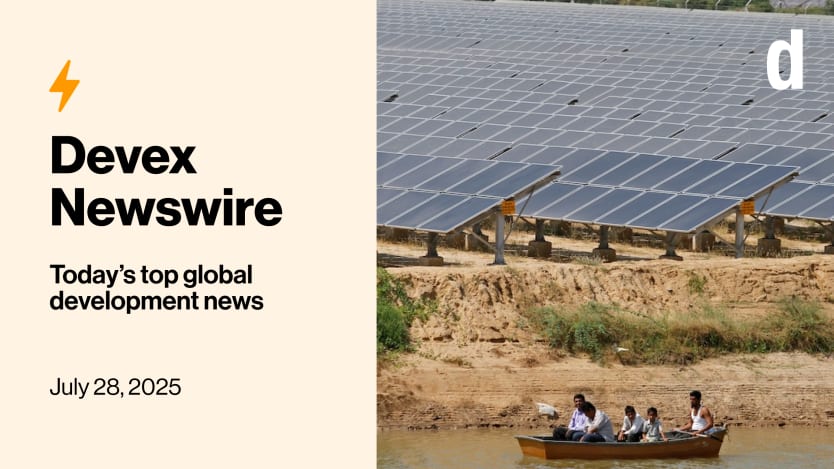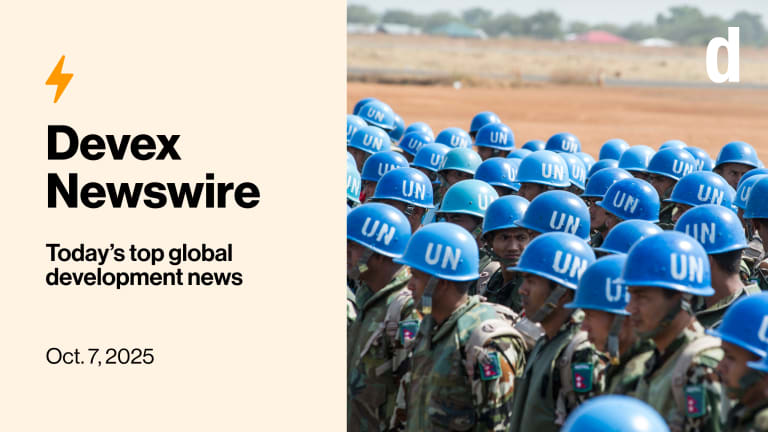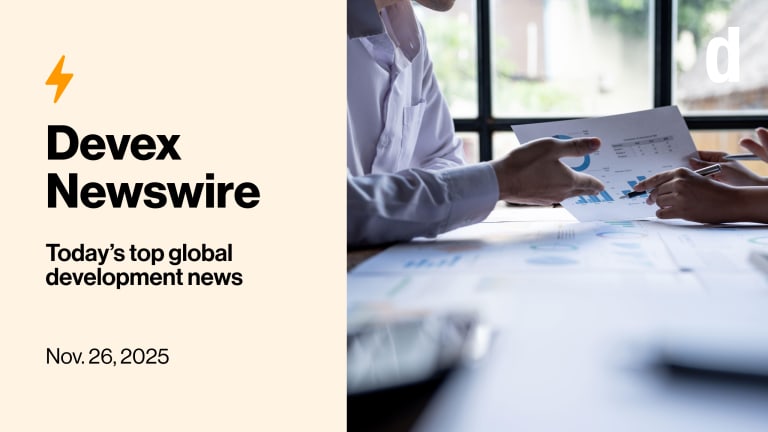
As aid budgets shrink, the private sector is carving out a bigger role in global development. The message is increasingly clear: investment is impact.
Also in today’s edition: The former Czech PM talks development, selfishness, and aid, and is Asia-Pacific ready for the next pandemic?
+ Join us tomorrow, July 29: Devex is hosting a digital career event offering expert guidance on portfolio careers — a path for those looking to do purpose-driven work on their own terms. Save your spot now.
New models, real impact
The age of government-led development might be fading — but in some ways, the private sector is stepping in to fill the gap. In 2023, development banks and DFIs mobilized a record $87.9 billion in private capital through guarantees, co-financing, and risk-sharing incentives. That’s a 24% jump from the year before — but still far from the trillions the world once hoped for.
At the recent Financing for Development conference in Sevilla, Spain, investors, bankers, and social entrepreneurs packed the rooms — ready not just to talk, but to pitch. One standout voice: Lucy Heintz of Actis, who called the mismatch between energy needs and investment in growth markets an “enormous opportunity.” She pointed to India as a model, with strong policy, smart regulation, and blended renewable solutions that have turned it into the world’s third-largest infrastructure market.
Standard Chartered’s Marisa Drew is taking a different approach — tying returns to real-world results. She helped design the Rhino Bond, a $45 million social impact bond that links investor payouts to rhino population growth in South Africa. “It’s a nice expression of somebody saying, ‘I’m prepared to win if you win,’” she said — and now, others are eyeing similar models for everything from health to education.
Meanwhile, J.P. Morgan is using its global reach to link impact-hungry investors with real development opportunities, my colleague Elissa Miolene writes. The development finance institution it created 5 years ago has helped clients such as DP World scale up in countries like Brazil and Senegal — financing new ports, boosting exports, and creating clearer pathways to capital.
In Senegal and Guinea-Bissau, this has meant cashew producers getting their products to global buyers. In Brazil, it has led to a new container terminal handling 12.5 million metric tons of grain and fertilizer. For J.P. Morgan, it’s part of a push to catalyze $2.5 trillion for sustainable development over the next decade.
The message we’re hearing? The private sector isn’t just showing up — it’s starting to reshape how development gets done. The tools are new, the scale is growing, and the outcomes — ideally — are shared.
Read: How is the private sector thinking about development? (Pro)
+ Start your 15-day free Devex Pro trial today and gain immediate access to in-depth analyses, insider insights, crucial funding data, exclusive event access, and much more. Discover the advantage of having Devex Pro.
Selfish crossroads
Also in Sevilla, Jan Fischer didn’t hold back. The former Czech prime minister and EBRD VP painted a bleak picture of global cooperation: “The problem is that we are losing the ability to understand each other. And it’s eroding the solidarity and feeling of solidarity … We are getting a little bit selfish. That’s sometimes like the iron dialogue of the deaf.”
Fischer warned that today’s fractured geopolitics — from the war in Ukraine to rising defense budgets — is chipping away at the foundations of multilateralism. The “world and this planet is on the crossroad,” he said, and the big institutions built after WWII — including the United Nations and the global development banks — are at risk.
But he’s not without hope. He still sees “willingness to overcome the fragmentation, to mobilize these sources, to reform the international financial institutions.” And having led EBRD, he knows what those institutions can do when focused on “feasible projects” and operational efficiency.
One thing he’s sure about? Talking every 10 years — as the Financing for Development conference does — isn’t enough, my colleague Thomas Cserép writes. In a “world full of uncertainties,” Fischer said, we need more than “huge and very costly events.” What’s needed instead is continuous, concrete engagement — and “mechanism agreed upon what to do in between these 10 years.”
Read: ‘We are getting a little bit selfish,’ argues former Czech PM Fischer
Can the world walk the talk on food?
The U.N. Food Systems Summit “stocktaking moment” — or UNFSS+4 — has started in Addis Ababa as more than 3,000 delegates from around the world gather to assess whether efforts to transform how food is grown, distributed, and consumed are delivering real results.
Food systems transformation is seen as key to ending hunger, tackling climate change, and building fairer agricultural systems. “Governments have started to walk the talk,” Stefanos Fotiou, director of the U.N. Food Systems Coordination Hub, tells my colleague Ayenat Mersie, who is on the ground in Ethiopia to cover the summit. But he warns that momentum will stall without new financing and stronger partnerships: “We need to hear finance commitments from the private sector.”
Co-hosted by Ethiopia and Italy, the summit comes as global hunger climbs and donor budgets shrink. While more than 120 countries have developed national food systems strategies, many are struggling to implement them amid constrained resources and competing priorities.
The meeting is also facing criticism from civil society groups. The Civil Society and Indigenous Peoples’ Mechanism — representing more than 380 million people — is boycotting the summit, citing a lack of safeguards against corporate influence, the exclusion of urgent food crises such as Gaza, and insufficient attention to deeper structural drivers of hunger. Food must be elevated beyond a single ministry and treated as a political priority across government, the group argues.
Want to connect or share what you’re seeing on the ground in Addis Ababa? Drop Ayenat a line at ayenat.mersie@devex.com.
ICYMI: UNFSS+4 is coming. Are food systems actually transforming?
+ For more content like this, sign up to Devex Dish, our free weekly newsletter on the global food system.
Asia-Pacific pandemic booster
The COVID-19 pandemic laid bare major cracks in the Asia-Pacific region’s vaccine systems — money wasn’t enough when manufacturing and regulation lagged. Now, the Asian Development Bank is helping countries build capacity, boost regulation, and strengthen supply chains before the next crisis hits.
Still, not every country should be making its own vaccines, Senior Reporter Jenny Lei Ravelo writes. “With a small population base, you can’t be putting your feasibility studies only on the prospects that you will be exporting them later,” says Dr. Dinesh Arora, principal health specialist at ADB. These countries shouldn’t assume they’ll be able to offset costs by exporting vaccines in the future.
Instead, experts such as Hani Kim, executive director of the RIGHT Foundation, a South Korea-based funding agency, are calling for a smart, tiered network: “There’s a great value in acknowledging where different manufacturers are situated ... if we want to achieve speed.” But even with manufacturing, without good data, access fails. “If our governments don’t have the capability to collect high-quality data ... you’re not going to get to the people that need them,” Kim adds.
Procurement is still a challenge. During the pandemic, countries struggled to secure vaccine doses. Prashant Yadav, a health supply chains expert who served as an external adviser to the World Bank’s COVID-19 program, says he knew countries needed to make advance purchase contracts with many of the vaccine developers, but it was tough not knowing which ones would succeed. To address this, they created a COVID-19 vaccine portfolio, which listed vaccine candidates that had a high chance of success — and with this being “a problem that will repeat,” this concept of portfolio is essential for future pandemics, Yadav explains.
Tech will help. Think AI dashboards, solar cold-chain, and drones, says Sarabjit Chadha, Asia regional director at FIND. But animal vaccines? Still miles behind. “A few notches below zero,” according to Syed Ahmed, CEO of Techinvention, a biotech company based in India.
And secrecy will not help. “Nobody should sign an NDA or contract of this type,” warns Philipp Kalpaxis, principal procurement specialist at the ADB, noting some countries paid more than others.
The fix? More collaboration, more transparency — and financing that shows up fast when it’s needed.
Read: How Asia-Pacific can boost vaccine access in the next pandemic (Pro)
+ On July 30, join us for a Devex Pro Briefing with Neil Buddy Shah, the CEO of Clinton Health Access Initiative. Shah will discuss the most pressing questions facing the health sector after the unprecedented global health funding disruptions. Register now.
In other news
U.N. refugee chief Filippo Grandi warns that deep aid budget cuts are driving up migration to Europe and urges more financial support for countries that already host refugees rather than new asylum schemes. [Financial Times]
Israel says that more than 100 aid lorries have entered Gaza after the announcement of a "tactical pause" to allow humanitarian activity. [SCMP]
More than 600 children have died from malnutrition in Nigeria since the start of the year, according to Médecins Sans Frontiéres. [Al Jazeera]
Sign up to Newswire for an inside look at the biggest stories in global development.








